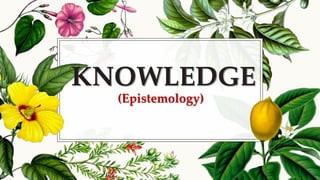
Knowledge (epistemology)
- 2. What is Knowledge? Ancient Greek philosophers; “Knowledge is power. Knowledge to be power over oneself.” To modern man; “ Knowledge is power over the world. Knowledge is the power to control and manipulate our environment.”
- 3. the "Tri-Partite" or "Justified True Belief" (JTB) theory. The traditional approach is that knowledge requires three necessary and sufficient conditions, so that knowledge can then be defined as JTB "justified true belief":
- 4. Truth Condition "To say of something which is that it is not, or to say of something which is not that it is, is false. However, to say of something which is that it is, or of something which is not that it is not, is true." (Aristotle)
- 5. Belief Condition One cannot know something that One doesn't even believe in, the statement, "I know x, but I don't believe that x is true" is contradictory.
- 6. Justification Condition “Lucky guesses cannot constitute knowledge; we can only know what we have good reason to believe.”
- 7. JTB Model (JTB) S knows that P iff (1) P is true; (2) S believes that P; and (3) S is justified in believing that P. S= Subject P= Proposition justified-true-belief
- 9. ” Propositional knowledge, "knowledge-that" as opposed to "knowledge- how" (for example, the knowledge that "2 + 2 = 4", as opposed to the knowledge of how to go about adding two numbers).
- 10. Two types of Propositional Knowledge “a priori”(or non-empirical), Before Experience a.k.a Analytic Knowledge “a posteriori” (or empirical), After Experience a.k.a . Synthetic Knowledge
- 12. Simply, we can define truth as: a statement about the way the world actually is. What is Truth?
- 13. The COHERENCE theory describes truth in terms of interconnected belief. The CORRESPONDENCE theory describes truth in terms of a relation concepts or propositions have to the actual world. Finally POSTMODERNISM lays out a view of truth in terms of individual perspectives and community agreement. Three main views of TRUTH
